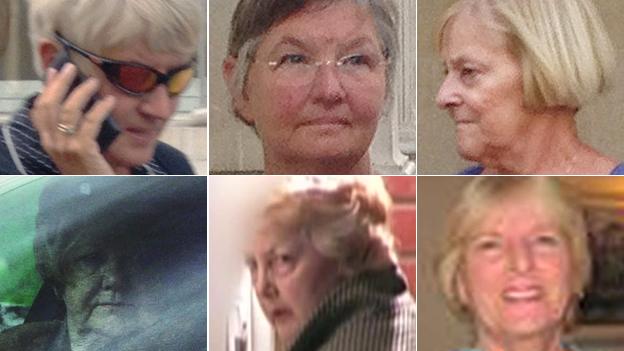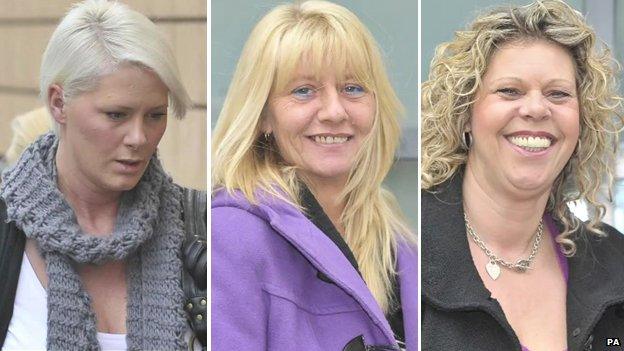'Pyramid scheme' operation sees six women convicted
- Published
How the scheme operated and how the women were convicted
Six women have been convicted of operating a "pyramid" scheme in which thousands of investors lost money.
The "Give and Take" scheme operated in south-west England and south Wales five years ago, Bristol Crown Court heard.
All six were from the Bristol area and their scheme saw more than £20m invested by about 10,000 members of the public, often vulnerable women.
It can now be reported three other women had already received suspended sentences for promoting the scheme.
'Lifelong financial hardship'
The group encouraged people to "beg, borrow or steal" £3,000 to put into the scheme between May 2008 and April 2009.
It began in Bath and Bristol and spread to Gloucester, Bridgwater, Cheltenham, Torquay, Weston-super-Mare and Wales.
Sue Jones, from Caldicot, Monmouthshire, tells how she and her son lost £3,000
Those running the scheme told its investors it had a quick, easy and legal way to make cash - by paying in £3,000 they would receive more than £20,000, as more members joined.
But eventually the number of new recruits dried up and the scheme collapsed, with 90% of investors losing their money.
Eleven women, aged between 34 and 69, became the first to be prosecuted for such a scheme, under new legislation in the Consumer Protection from Unfair Trading Act 2008.

Clockwise from top left: Hazel Cameron, Mary Nash, Susan Crane, Carol Chalmers, Jennifer Smith-Hayes, Laura Fox
Following two trials in 2012 and 2013, which can now be reported for the first time, three were convicted, three pleaded guilty, one was acquitted and two juries could not reach a verdict on another.
Judge Mark Horton had banned reporting of the case until the conclusion of all the trials.
"These cases and the actions and attitudes of these defendants demonstrate the way in which pyramid promotional schemes and chain gifting schemes can be secretly created and quickly spread amongst a vast number of people and over several counties," he said.
He also said the scheme caused a loss to the general public of about £19m, and that it had targeted vulnerable women.
"A number of these women suffered enormous and in some cases lifelong financial hardship due to their involvement in this scheme.
"The public need to be aware that schemes like this lead to the destruction of lifelong friendships and families and in some cases whole communities as friends and family are lured into such a scheme."
Judge Horton added that 88% of those who contributed to the scheme would lose their money.
Pyramid scheme victim David Gough explains how he was persuaded to get involved
'Old adage'
A third trial was due to begin at Bristol Crown Court on Wednesday. However, the women entered guilty pleas before a jury was sworn in.
Mary Nash, 65, Susan Crane, 68, and Hazel Cameron, 54, will be sentenced in October. All three admitted operating and promoting the pyramid scheme.
Laura Fox, 69, East Harptree, Jennifer Smith-Hayes, 69, of Bishopsworth and Carol Chalmers, 68, of Weston-super-Mare were convicted of operating and promoting the scheme during a trial in 2012.
They were sentenced to nine months in prison.

(From left) Sally Phillips, Jane Smith and Rita Lomas admitted promoting the scheme
Sally Phillips, 34, of Hengrove, Jane Smith, 50, of Bishopsworth, both Bristol and Rita Lomas, 49, of Whitchurch, Somerset admitted promoting the scheme in 2012.
Phillips received a three-month suspended prison sentence, Smith a four-month suspended sentence and Lomas a four-and-a-half month suspended sentence.
Two trials of Tracey Laurence, 60, of Bradley Stoke, South Gloucestershire failed to reach a verdict.
Rhalina Yuill, 34, of St George, Bristol was acquitted of promoting a pyramid scheme on her second trial.
Lord Toby Harris, chairman of National Trading Standards - which led the investigation - said the scheme targeted a "huge number of people, most of whom have lost large amounts of their money".
"Ensuring that the people running criminal schemes such as this one are brought to justice is a priority for National Trading Standards," he said.
How does a 'pyramid scheme' work?
Gary Bracken, of the Competition and Markets Authority, advised people not to become involved in such schemes.
He said: "The old adage of 'if something looks too good to be true then it probably is' is really, really true here.
"There's no way you're going to make a lot of money out of a pyramid scheme unless you are one of the very few people that are lucky at the beginning of them."